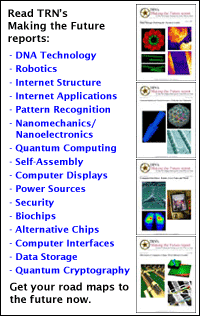
Single
molecule drives transistor
By
Eric Smalley,
Technology Research NewsEditor's note: this research has been withdrawn by the scientists.
Computer processor and memory chips have millions of electronic switches, or transistors, that channel electrical current. The most common way to make faster chips is to use smaller transistors, shortening the paths electrons have to travel to switch the devices on and off.
Researchers at Bell Labs have shown that a single molecule can form the semiconducting channel of a transistor, which sets the stage for making an entire transistor out of a single molecule. "We [have] demonstrated transistor action using a single active molecule," said Hendrik Schön, a physicist at Bell Labs.
The molecule in the researchers' prototype transistor is about one nanometer long, which is about 100 times shorter than the transistors in today's computer chips.
The chemical assembly process used to make the molecular transistor is also easier and potentially cheaper to carry out than today's semiconductor manufacturing process, which uses light and chemicals to etch lines into silicon wafers.
Organic components like the researchers' molecular channel are also flexible and so could be built into sheets of plastic.
Transistors have five parts: a semiconducting channel that carries the flow of electrons, a source electrode that puts electrons into the channel, a drain electrode that takes electrons out of the channel, a gate electrode that turns the flow on and off, and an insulator that separates the gate electrode and the channel.
In October, Bell Labs researchers made the conducting channel of a transistor out of a single layer of molecules. To allow a single molecule to take on the semiconducting channel role, the researchers made this monolayer out of a mixture of semiconducting and insulating molecules in order to isolate an individual semiconducting molecule.
By setting the mixture to a ratio of about one semiconducting molecule to 5,000 insulating molecules, the researchers end up with only one semiconducting molecule in the transistor, he said.
In field-effect transistors like the Bell Labs' device, current flowing through the gate electrode produces an electric field that lowers the resistance of the semiconducting channel, causing current to flow from the source electrode through the channel to the drain electrode. Computers use this flow and absence of flow to represent the ones and zeros of digital information.
An important characteristic of transistors is gain, which means the device boosts the signal passing through it. Without a boost from each transistor, the signal in a computer circuit would peter out. "The single molecule devices... show gain, therefore they might be incorporated into logic circuits for computing," said Schön.
The researchers' work demonstrates that a single molecule can function as the active component of a transistor, but there's a long way to go to make the device practical, said Schön. "Producing separate gates will be challenging; we're looking towards more complex molecules, which consist of different parts" that would function as the five parts of a transistor, said Schön.
Another challenge is wiring the single molecules together in the precise arrangements needed to make up circuits, Schön added.
It will be at least ten years before manufacturers can produce transistors using single-molecule semiconductor layers, said Schön.
Schön's research colleagues were Hong Meng and Zhenan Bao. They published the research in the November 8, 2001 online issue of the journal Science. The research was funded by Lucent Technologies.
Timeline: >10 years
Funding: Corporate
TRN Categories: Semiconductors; Integrated Circuits; Materials Science and Engineering
Story Type: News
Related Elements: Technical paper, "Field-Effect Modulation of the Conductance of Single Molecules," Sciencexpress, November 8, 2001
Advertisements:
December 12, 2001
Page One
E-paper coming into view
Semiconductors control quantum spin
Cold electrons crystallize
Neat not always organized
Single molecule drives transistor
News:
Research News Roundup
Research Watch blog
Features:
View from the High Ground Q&A
How It Works
RSS Feeds:
News
Ad links:
Buy an ad link
| Advertisements:
|
 |
Ad links: Clear History
Buy an ad link
|
TRN
Newswire and Headline Feeds for Web sites
|
© Copyright Technology Research News, LLC 2000-2006. All rights reserved.